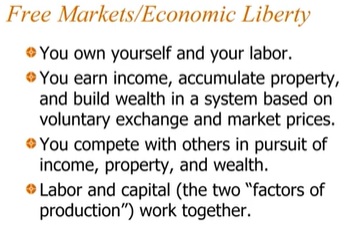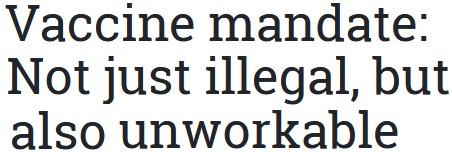Just like I’ve never had (until recently) any reason to define capitalism, I also have never felt any need to define libertarianism. Some people use the non-aggression principle, but that strikes me as more of a statement about how we should behave.
What if we’re trying to define the rules for libertarian governance?
In that case, my definition is very much based on property rights. What’s mine is mine and what’s yours is yours, and we both have the right to engage (or to not engage) in voluntary exchange. I realize that’s not the most elegant or comprehensive statement of principles, but I think it provides a useful framework for the debate over vaccine mandates.
Regarding that issue, I’m glad that private companies had the expertise and opportunity to develop vaccines against the coronavirus, and I got vaccinated as soon as possible. That being said, I definitely don’t think government should force anyone to make that choice. But I also think that people who opt against vaccination should accept the non-governmental consequences.
Here’s some of what I wrote about this topic back in April.
What if private businesses decide that customers are only allowed if they prove they’ve been vaccinated? From a libertarian perspective, guided by core principles such as property rights and freedom of association, that should be totally acceptable. And that’s true even if we think the owners of the businesses are making silly choices. After all, it’s their property.
The Dispatch has an article on this controversy.
Written by Andrew Egger, it starts by pointing out that there’s a political fight in South Dakota because a private company has announced that all employees must be vaccinated.
South Dakota’s largest employer is Sanford Health, a hospital and health care system that employs nearly 10,000 people in the eastern half of the state. On July 22, Sanford, which operates in both Dakotas and Minnesota, announced it would begin requiring all its employees to get vaccinated for COVID by November 1. Within weeks, two Republican members of the state House, Reps. Jon Hansen and Scott Odenbach, had introduced legislation punching back. The COVID-19 Vaccine Freedom of Conscience Act would give South Dakotans “the right to be exempt from any COVID-19 vaccination mandate, requirement, obligation, or demand on the basis that receiving a COVID-19 vaccination violates his or her conscience.” …By the end of August, state House Speaker Spencer Gosch had come aboard the mandate ban effort as well. …The only problem: Noem doesn’t support the legislation.
Why is Governor Kristi Noem against the legislation?
For a very libertarian reason. She doesn’t think the government has the right to tell a private company how to operate.
…the laissez-faire approach that made Noem a conservative folk hero in last year’s fights has gotten her crosswise with her fellow Republicans on the issue of vaccine mandate bans. “Frankly, I don’t think businesses should be mandating that their employees should be vaccinated,” she said in a video posted to Twitter last week. “And if they do mandate vaccines to their employees, they should be making religious and other exemptions available to them. But I don’t have the authority as governor to tell them what to do.”
Amen.
If you believe in private property, the owners of a business should have the right to decide whom they employ and whom they do business with.
Just as consumers can choose where to shop and workers can choose to leave jobs they don’t like.
Here’s a final excerpt from the article.
“Nobody is stopping you from making that decision [not to get vaccinated], but you don’t have a right to a particular job,” Noem spokesman Ian Fury told The Dispatch. “The business owner has the right to his business. You do not have a right to an individual job, because you don’t own that business.” …Philosophically, that puts Noem firmly in the camp of free-market Republicans past: largely content to preside passively over a state economy in which companies are free to set their own standards of conduct and employees are free to work for companies that share their values—and quit jobs if they don’t.
The bottom line is that libertarians (and small-government conservatives) should not be upset about private companies making private decisions.
Instead, we should get irked when politicians try to mandate those decisions.
In a column for the Washington Examiner, Quin Hillyer condemns Joe Biden’s recent declaration that companies either must require vaccination or conduct constant testing.
President Joe Biden’s decision to require large private employers to ensure their workers are vaccinated or tested for the coronavirus is problematic not just in terms of the Constitution, statutes, and liberty interests, but it is also highly impractical. …This is crazy. If the onus is on the businesses, what are businesses to do if employees refuse to comply? Fire them all? …This rule is a recipe for lawsuits. Will businesses be caught in a bind — penalized for unvaccinated workers but also charged with unfair labor practices if they evade the mandate by reducing payrolls below 100? …If massive new testing is required as a mere screening method, even for those feeling perfectly healthy, how will medical personnel keep up? Who will keep administrative tabs on all this? And if businesses are required to provide time off for workers to get tested, how will their own efficiency and productivity suffer?
Given the fact that Biden is a career politician with no experience in the private sector, I guess we shouldn’t be surprised by this White House proposal.
After all this is an Administration that thinks copying the failed fiscal policies of Greece, France, and Italy is how you “build back better.”


No comments:
Post a Comment